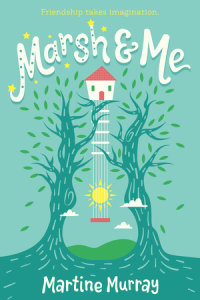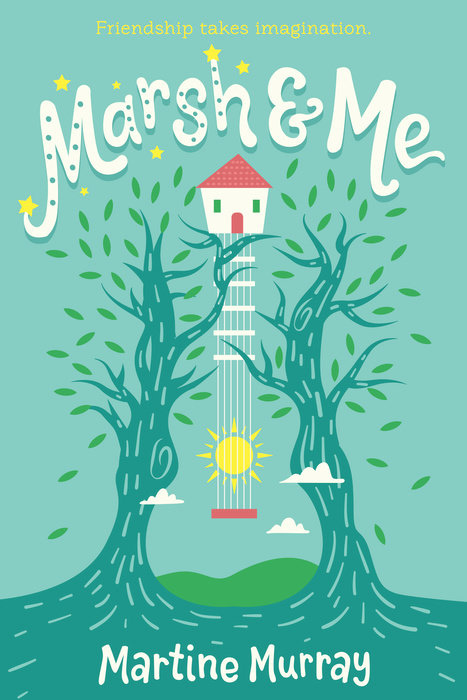Marsh & Me
Friendship takes some imagination in this story of two kids who discover they have more in common than they knew, for fans of Stargirl.
Joey wants more than anything to talk to someone about music, to be a part of the group. But he's so shy, something always seems to get in the way. He escapes to a secret place on a hill, until one day he discovers that a strange girl has invaded the hill--and built a fort that looks like a spaceship. The hill is the one place he can be himself, so Joey decides he needs to stake his claim. He confronts the girl, whom he calls Marsh (short for Martian), and finds that she has been busy in her little makeshift "spaceship," building an imaginary world.
It's a world that hides secrets, but might also be the very thing to bring Joey out of his shell. And when Joey decides to follow Marsh home, her real life is not what he expected. But there he finds that they have music in common and he realizes that no distance is so great that music cannot bridge.
Martine Murray brings a unique friendship to life in this openhearted, imaginative tale.
An Excerpt fromMarsh & Me
There are three places in my life. Hill, home and school. If you drew a map of me, I would be triangular. Or if you drew a portrait of me, I would have three aspects. Maybe even three heads. I’d like a painting of a three-headed me, but that’s because I suspect I’m secretly a surrealist, like Andre Breton. Heard of him? He’s a poet, like my mum, only he started an art movement that led to some pretty crazy paintings that looked more like dreams than real life. That’s why I’m a surrealist--because I’m stuck somewhere between dreams and real life. If only life wouldn’t always stamp dreams out with its onward march.
Here’s the three me’s. At home I’m Joey, the unsporting, sometimes broody closet guitarist and older brother. At school I’m Joseph M. Green, the quiet kid who doesn’t cause much trouble, but doesn’t hold much interest, either. That’s all real life. But on the hill I’m the heroic, loud, surrealist loner--ready and waiting for adventure, or at least for something to happen, or more specifically for something to happen to me. I’m loud because I play my guitar there, and I play it without one bit of restraint. But that’s where I live in my own dream.
The me I like the best is that me. The one who deals in dreams. The one on the hill, sitting on the grass as the sun sinks and the shadows are long and the world is far away. Everything glows then--trees, sky, ground, even me. Up there, I own the world. I get a waft of triumph. I’m playing my guitar and there’s only the birds to hear me and only the sky to fill with notes. No one to snigger at me since, I admit it straight up, I’m no guitar hero. But at least up there I can imagine I am. Up there, I go about with a Jimi Hendrix swagger if I feel like it. I’m anything I want to be--famous astronaut, mountain climber, warrior, poet. . . .
The sound of my guitar floats out over the hill, just like the coos of the wood pigeons do, or the puffs of winter woodsmoke, or the hoot of the train when it roars past. If I belong anywhere, it’s to the hill and to the me that the hill brings out. The me who can strum those chords as long and loud as I like. But as you know, the sun sinks, the moment passes and I have to get home for dinner. I skulk out of my dream life and back into real life, where I’m just plain awkward and unfitting. There I’m like a fish trying to walk on land.
When I get home, Dad is watering the vegetable garden.
“Hiya, Joey, where have you been?”
“Up the hill,” I say. “With Black Betty,” I add, just to make sense of my hill habit. Black Betty is our dog. Black as the night, of course, and partial to a walk, which makes her a perfect excuse and companion for my late-afternoon ventures. Dad is an odd-jobs man, which means he finds a way to earn a living in whatever way he can, when he isn’t making sculptures in his shed. Making sculptures in his shed is what he prefers, but it doesn’t pay the bills.
“Did you have a nice walk?”
“Yeah.” This is typical of our conversations. Dad is sort of busy doing something, like watering the tomatoes, and with the other half of his mind he tries to show an interest in what I’ve been doing. But because I know he isn’t really very interested in what I’ve actually been doing (playing guitar to the world), I never talk about it, and he believes instead that I have this not-very-exciting habit of taking Black Betty for a walk.
“How was school today?” he says, dropping the hose to pick some tomatoes.
“All right,” I say. I tend to give up on these conversations before they have even started. What am I going to say? School is always kind of difficult, because I’m not really any good at anything and this makes me feel like a loser and then I act like a loser and once you get cast in the role of loser, even if it was you who cast yourself, no one wants to hang out with you. Except Digby, who for some reason accepts me, accepts the dull, unshining, defeated soursop me that I am at school. Digby is one of a kind, though. He’s not impressed by the sporting stars. Not like Dad. You can’t blame Dad, since he was one of those sporty types himself. He’s athletic, he’s got muscles and he’s got skills. You should see him throw. We went for a swim at the reservoir last weekend. I was floating rather serenely, in my used car tire, dreaming about something. I was a long way away from the edge, where Dad was standing with Opal. But he threw a tennis ball at me and it made it all the way exactly to my hands. I still fumbled it. Dad shook his head, in despair, I think. But I dropped it partly ’cause I didn’t believe it was possible to throw so far and to have such good aim, so I wasn’t ready. I just get nervous anytime Dad tries to do something sporty with me. Sports isn’t my thing. In fact, it’s as if Dad and I come from different planets. I can only imagine how disappointing it is to have a son who you can’t play catch with.
Dad hands me some tomatoes so he can get some leaves of basil. He knows better than to throw them to me. They’d be sauce before we got them to the kitchen.
“The good news is,” he says, “I’m cooking pasta tonight.”
It’s not the best-ever news. The best-ever news would be that I suddenly grew muscles and could kick a football from one side of the oval to the other. Or I grew my real-life land legs and stopped feeling like a fish gasping on the playground, where real life plays itself out in ball games, good jokes, plain tomfoolery and bravado.
But Dad’s pasta is pretty good, especially when it’s cooked with homegrown tomatoes.

